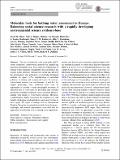Files in this item
Molecular tools for bathing water assessment in Europe : balancing social science research with a rapidly developing environmental science evidence-base
Item metadata
| dc.contributor.author | Oliver, D.M. | |
| dc.contributor.author | Hanley, Nicholas David | |
| dc.contributor.author | van Niekerk, M. | |
| dc.contributor.author | Kay, D. | |
| dc.contributor.author | Heathwaite, A.L. | |
| dc.contributor.author | Rabinovici, S.J.M. | |
| dc.contributor.author | Kinzelman, J.L. | |
| dc.contributor.author | Fleming, L.E. | |
| dc.contributor.author | Porter, J. | |
| dc.contributor.author | Shaikh, S. | |
| dc.contributor.author | Fish, R. | |
| dc.contributor.author | Chilton, S. | |
| dc.contributor.author | Hewitt, J. | |
| dc.contributor.author | Connolly, E. | |
| dc.contributor.author | Cummins, A. | |
| dc.contributor.author | Glenk, K. | |
| dc.contributor.author | McPhail, C. | |
| dc.contributor.author | McRory, E. | |
| dc.contributor.author | McVittie, A. | |
| dc.contributor.author | Giles, A. | |
| dc.contributor.author | Roberts, S. | |
| dc.contributor.author | Simpson, K. | |
| dc.contributor.author | Tinch, D. | |
| dc.contributor.author | Thairs, T. | |
| dc.contributor.author | Avery, L.M. | |
| dc.contributor.author | Vinten, A.J.A. | |
| dc.contributor.author | Watts, B.D. | |
| dc.contributor.author | Quilliam, R.S. | |
| dc.date.accessioned | 2015-11-09T16:10:01Z | |
| dc.date.available | 2015-11-09T16:10:01Z | |
| dc.date.issued | 2015-09-21 | |
| dc.identifier | 229678968 | |
| dc.identifier | a5ee0e19-e04b-41a2-b330-60dfee55db97 | |
| dc.identifier | 84954375580 | |
| dc.identifier | 000368038800005 | |
| dc.identifier.citation | Oliver , D M , Hanley , N D , van Niekerk , M , Kay , D , Heathwaite , A L , Rabinovici , S J M , Kinzelman , J L , Fleming , L E , Porter , J , Shaikh , S , Fish , R , Chilton , S , Hewitt , J , Connolly , E , Cummins , A , Glenk , K , McPhail , C , McRory , E , McVittie , A , Giles , A , Roberts , S , Simpson , K , Tinch , D , Thairs , T , Avery , L M , Vinten , A J A , Watts , B D & Quilliam , R S 2015 , ' Molecular tools for bathing water assessment in Europe : balancing social science research with a rapidly developing environmental science evidence-base ' , Ambio . https://doi.org/10.1007/s13280-015-0698-9 | en |
| dc.identifier.issn | 0044-7447 | |
| dc.identifier.uri | https://hdl.handle.net/10023/7758 | |
| dc.description | The Working Group and associated workshop series were funded by the Natural Environment Research Council as part of the Delivering Healthy Water project (NE/I022191/1). LF received funding in part by the European Regional Development Fund Programme and the European Social Fund Convergence Programme for Cornwall and the Isles of Scilly | en |
| dc.description.abstract | The use of molecular tools, principally qPCR, versus traditional culture-based methods for quantifying microbial parameters (e.g., Fecal Indicator Organisms) in bathing waters generates considerable ongoing debate at the science–policy interface. Advances in science have allowed the development and application of molecular biological methods for rapid (~2 h) quantification of microbial pollution in bathing and recreational waters. In contrast, culture-based methods can take between 18 and 96 h for sample processing. Thus, molecular tools offer an opportunity to provide a more meaningful statement of microbial risk to water-users by providing near-real-time information enabling potentially more informed decision-making with regard to water-based activities. However, complementary studies concerning the potential costs and benefits of adopting rapid methods as a regulatory tool are in short supply. We report on findings from an international Working Group that examined the breadth of social impacts, challenges, and research opportunities associated with the application of molecular tools to bathing water regulations. | |
| dc.format.extent | 419749 | |
| dc.language.iso | eng | |
| dc.relation.ispartof | Ambio | en |
| dc.subject | Bathing Water Directive | en |
| dc.subject | Fecal indicator organism | en |
| dc.subject | Microbial pollution | en |
| dc.subject | Public perception | en |
| dc.subject | Recreational water quality | en |
| dc.subject | Risk communication | en |
| dc.subject | GE Environmental Sciences | en |
| dc.subject | T-NDAS | en |
| dc.subject.lcc | GE | en |
| dc.title | Molecular tools for bathing water assessment in Europe : balancing social science research with a rapidly developing environmental science evidence-base | en |
| dc.type | Journal article | en |
| dc.contributor.institution | University of St Andrews. Geography & Sustainable Development | en |
| dc.contributor.institution | University of St Andrews. Social Anthropology | en |
| dc.identifier.doi | https://doi.org/10.1007/s13280-015-0698-9 | |
| dc.description.status | Peer reviewed | en |
This item appears in the following Collection(s)
Items in the St Andrews Research Repository are protected by copyright, with all rights reserved, unless otherwise indicated.

